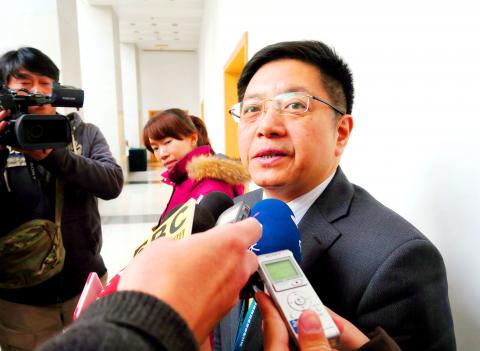The central government yesterday expressed its deep regret and discontent with the International Criminal Police Organization’s (Interpol) rejection of its bid to attend the organization’s upcoming general assembly.
Asked if Beijing was behind Interpol’s decision, Minister of Foreign Affairs David Lee (李大維) said “that is a very obvious factor.”
Presidential Office spokesman Alex Huang (黃重諺) last night urged China to acknowledge the Republic of China’s existence and stop hurting the well-being of Taiwanese by obstructing Taiwan’s participation in international organizations.

Photo: CNA
The government will continue to work closely with the US and other like-minded nations to promote Taiwan’s participation in Interpol, in the hope that Taiwan can be included in the global network for public security protection, the Ministry of Foreign Affairs said.
Taiwan was forced to withdraw from Interpol in 1984 when China joined the organization.
For the first time in 32 years, the government last month applied to participate as an observer at Interpol’s 85th general assembly, which runs from tomorrow to Friday in Bali, Indonesia.
Interpol president Mireille Ballestrazzi and secretary-general Jurgen Stock separately wrote to Criminal Investigation Bureau Commissioner Liu Po-liang (劉柏良) stating the organization’s decision to turn down Taiwan’s application, the ministry said.
The ministry said that Taiwan’s bid to participate in the assembly does not involve politics, but is intended to facilitate cooperation with the police forces of other nations and contribute to global efforts against organized crime, cybercrime, cross-border crime and terrorism.
With cross-border crime becoming a serious problem amid globalization, having no access to Interpol information is posing a challenge to Taiwan’s crime-fighting operations, the ministry said, urging Interpol to deal with Taiwan’s case positively and pragmatically based on the need to maintain global security.
Considering the need to maintain security during next year’s Universiade in Taipei, the ministry has also requested that Interpol allow Taiwan to access its I-24/7 global police communications system and the Stolen and Lost Travel Documents database.
Meanwhile, the ministry said it appreciated the US’ support for Taiwan’s participation in the assembly.
Both the US Senate and House of Representatives in March passed legislation requiring the US secretary of state to develop a strategy to obtain observer status for Taiwan in Interpol. The bill was then signed into law by US President Barack Obama.
Separately yesterday, the Mainland Affairs Council urged China to stop obstructing Taiwan’s efforts to particiate in international organizations.
Taiwan and China should treat each other in a friendly way and seek to resolve differences of opinion through bilateral dialogue in the interests and well-being of their people, the council said.
A survey conducted by the council last month revealed that 80 percent of Taiwanese believe Taiwan’s bids to take part in international organizations should not be subject to political interference, the council said, urging Beijing and the international community not to ignore public opinion in Taiwan.
Additional reporting by Su Fang-ho

DAREDEVIL: Honnold said it had always been a dream of his to climb Taipei 101, while a Netflix producer said the skyscraper was ‘a real icon of this country’ US climber Alex Honnold yesterday took on Taiwan’s tallest building, becoming the first person to scale Taipei 101 without a rope, harness or safety net. Hundreds of spectators gathered at the base of the 101-story skyscraper to watch Honnold, 40, embark on his daredevil feat, which was also broadcast live on Netflix. Dressed in a red T-shirt and yellow custom-made climbing shoes, Honnold swiftly moved up the southeast face of the glass and steel building. At one point, he stepped onto a platform midway up to wave down at fans and onlookers who were taking photos. People watching from inside

A Vietnamese migrant worker yesterday won NT$12 million (US$379,627) on a Lunar New Year scratch card in Kaohsiung as part of Taiwan Lottery Co’s (台灣彩券) “NT$12 Million Grand Fortune” (1200萬大吉利) game. The man was the first top-prize winner of the new game launched on Jan. 6 to mark the Lunar New Year. Three Vietnamese migrant workers visited a Taiwan Lottery shop on Xinyue Street in Kaohsiung’s Gangshan District (崗山), a store representative said. The player bought multiple tickets and, after winning nothing, held the final lottery ticket in one hand and rubbed the store’s statue of the Maitreya Buddha’s belly with the other,

‘NATO-PLUS’: ‘Our strategic partners in the Indo-Pacific are facing increasing aggression by the Chinese Communist Party,’ US Representative Rob Wittman said The US House of Representatives on Monday released its version of the Consolidated Appropriations Act, which includes US$1.15 billion to support security cooperation with Taiwan. The omnibus act, covering US$1.2 trillion of spending, allocates US$1 billion for the Taiwan Security Cooperation Initiative, as well as US$150 million for the replacement of defense articles and reimbursement of defense services provided to Taiwan. The fund allocations were based on the US National Defense Authorization Act for fiscal 2026 that was passed by the US Congress last month and authorized up to US$1 billion to the US Defense Security Cooperation Agency in support of the

HIGH-TECH DEAL: Chipmakers that expand in the US would be able to import up to 2.5 times their new capacity with no extra tariffs during an approved construction period Taiwan aims to build a “democratic” high-tech supply chain with the US and form a strategic artificial intelligence (AI) partnership under the new tariffs deal it sealed with Washington last week, Taipei’s top negotiator in the talks said yesterday. US President Donald Trump has pushed Taiwan, a major producer of semiconductors which runs a large trade surplus with the US, to invest more in the US, specifically in chips that power AI. Under the terms of the long-negotiated deal, chipmakers such as Taiwan Semiconductor Manufacturing Co (TSMC, 台積電) that expand US production would incur a lower tariff on semiconductors or related manufacturing